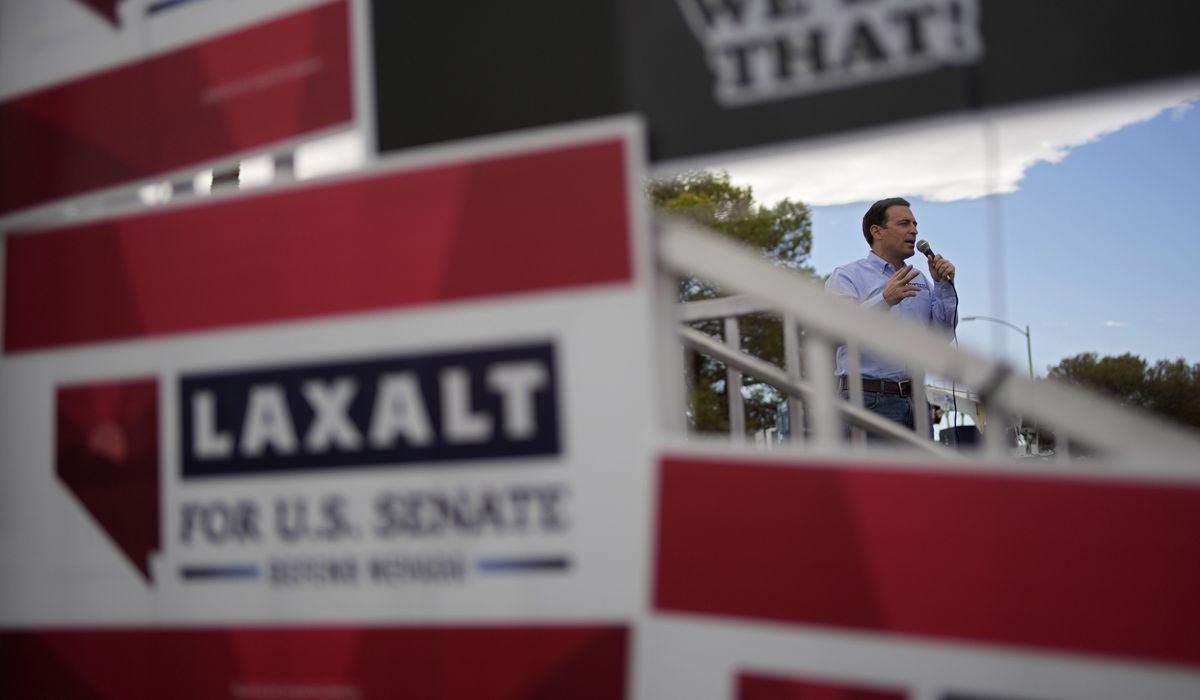
Voter dissatisfaction with inflation and crime is helping Republican Senate candidates in key matchups that will determine control of the upper chamber in the Nov. 8 elections.
A surge that Democrats enjoyed during the summer has stalled two weeks before Election Day, and polls show that the GOP is gaining ground in Arizona, Georgia, Nevada, Ohio, Pennsylvania and Wisconsin.
The dimmer outlook for Democrats follows a new uptick in gasoline prices and persistent inflation, while Republicans hammer Democrats on rising crime, which has emerged as a leading concern for voters nationwide.
The Senate midterm map includes toss-up races in Georgia, Nevada, Pennsylvania and Wisconsin, according to the nonpartisan Cook Political Report.
Republicans must win three of the four toss-up contests and hang on to all the seats they currently control to regain the majority in the Senate. The chamber is now split 50-50 between the parties and controlled by Democrats because of Vice President Kamala Harris’ tie-breaking vote.
“The margins are still tight in key races, but there is a feeling that the wind is starting to blow in favor of Republicans,” said polling analyst Ron Faucheux.
Other pollsters are even more bullish about GOP prospects.
Mason-Dixon Polling Managing Director Brad Coker said he believes many election surveys are underestimating Republican candidates by 5 points. He predicts a big night for the GOP.
“At least 54 seats, maybe one or two more,” Mr. Coker said.
October polling provides a glimpse of Republican momentum.
In Georgia, where Republican challenger Herschel Walker had been consistently trailing Democratic incumbent Sen. Raphael G. Warnock by a point or two, a Landmark Communications poll released Oct. 17 shows the two candidates are now tied.
In Pennsylvania, Republican Mehmet Oz has been closing in on Democratic Lt. Gov. John Fetterman’s small but consistent lead. A Fox 29/Insider Advantage poll released on Oct. 19 shows the two candidates tied.
Erin Covey, an analyst for the nonpartisan Inside Elections, said Mr. Oz is rebounding from a divisive primary, where the celebrity heart surgeon narrowly beat hedge fund CEO David McCormick, and that has boosted his support.
“It’s clear that he certainly has consolidated the Republican vote at this point, which is obviously not the case earlier in the summer,” Ms. Covey said.
Mr. Fetterman is also dealing with rising concerns about his health following a stroke in May that has left him with auditory processing problems. The two candidates are scheduled to meet for their only debate Tuesday night.
In Wisconsin, Republican incumbent Sen. Ron Johnson has maintained a durable lead in the polls since mid-September over Democratic Lt. Gov. Mandela Barnes.
Nevada’s Senate race, perhaps the biggest pick-up opportunity for the GOP, is a dead heat. But Republican Adam Laxalt took a small lead in most polling conducted after Labor Day and has hung on to that advantage over Democratic incumbent Sen. Catherine Cortez Masto.
Democrats, crushed by President Biden’s low approval ratings and voters’ everyday struggles with rising prices, have focused their messaging on abortion access. Abortion rights are a top concern among Democrat and independent voters since the Supreme Court overturned Roe v. Wade, the 1973 decision that legalized abortion nationwide. Democrats are framing GOP candidates as anti-choice and supportive of draconian laws that would severely limit reproductive freedom for women.
Abortion has remained among the most important issues among Democratic voters, but a New York Times/Siena College poll released this month found independent voters, including women, shifting to GOP candidates as the economy has begun to outweigh abortion as a top concern.
Republican candidates have honed in on rising crime and blamed Democrats for anti-police rhetoric and support of policies that reduce law enforcement efforts and show leniency toward dangerous criminals.
A Harvard-CAPS-Harris Poll reported Monday by The Hill found that 68% of voters surveyed named crime as a “very important” issue.
In North Carolina, where race analysts slightly favor Republicans to hold the open seat, GOP candidate Rep. Ted Budd has built a small but consistent lead over Democratic Cheri Beasley, whose robust fundraising has allowed her to flood the airwaves with campaign advertising.
The Sentinel Action Fund, the conservative Heritage Foundation’s super PAC, this week spent $1 million to air advertisements framing Ms. Beasley, a former defense attorney and a former state supreme court justice, as an anti-police candidate who worked to help a cop killer escape the death penalty.
Ms. Beasley has portrayed herself as a moderate. In one of her campaign ads, she says she has “held dangerous offenders accountable” and that “neither political party is getting it right” in Washington.
